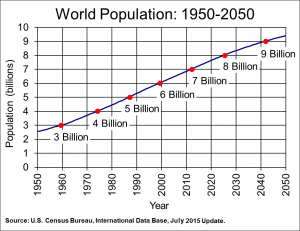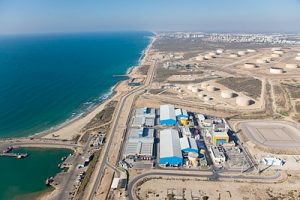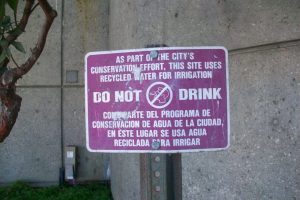Climate Change and Water Conflict — Keeping the Wolf at Bay
The crisis of our diminishing water resources is just as severe any wartime crisis we have ever faced. —Jim Wright, U.S. Representative, The Coming Water Famine, 1966
 Water is life. No truer words were ever spoken, for without freshwater, life simply cannot exist. The first civilization in recorded history settled in Mesopotamia, or the “cradle of civilization” which is now modern day Iraq, Iran, Syria, Kuwait, and Turkey, due to its location between the Tigris and Euphrates Rivers. And since the dawn of history, water conflict has erupted when supply has become scarce.
Water is life. No truer words were ever spoken, for without freshwater, life simply cannot exist. The first civilization in recorded history settled in Mesopotamia, or the “cradle of civilization” which is now modern day Iraq, Iran, Syria, Kuwait, and Turkey, due to its location between the Tigris and Euphrates Rivers. And since the dawn of history, water conflict has erupted when supply has become scarce.
 The first recorded water conflict took place in the “Gu’edena” region, known as the “edge of paradise.” King Urlama, who ruled Lagash from 2450 to 2400 BC, diverted regional water to boundary canals, which dried up boundary ditches and deprived Umma of water. Furthering his father’s work, King Urlama’s son cut off the water supply to Girsu, a city in Umma. Since this first recorded water war, water conflict has erupted regularly on planet Earth, with a high percentage of the conflict occurring in the Middle East.
The first recorded water conflict took place in the “Gu’edena” region, known as the “edge of paradise.” King Urlama, who ruled Lagash from 2450 to 2400 BC, diverted regional water to boundary canals, which dried up boundary ditches and deprived Umma of water. Furthering his father’s work, King Urlama’s son cut off the water supply to Girsu, a city in Umma. Since this first recorded water war, water conflict has erupted regularly on planet Earth, with a high percentage of the conflict occurring in the Middle East.
Prior to the mid-twentieth century, the vast majority of water conflict came about as a result of a pre-existing war; that is, water was diverted or targeted as a military tactic. However, since the 1950s, targeted disputes over water access have increased exponentially, which should come as no surprise. After all, global population has nearly tripled in that time, from 2.5 billion in 1950 to 7.3 billion in 2015. And it continues to grow.
At the same time, climate change has begun to wreak havoc on global water supplies. Since 1950, the planet has warmed by approximately 1°, resulting in about 5.7% of the Earth’s total land area shifting toward warmer and drier climate types from 1950–2010. These warmer climates include expansion of arid climate zones and reduction in polar ice caps. And that’s just from one single degree. Experts predict that the earth’s temperature will increase five times that amount during this century alone, and unless we globally commit to taking climate action, at least one-third of the globe will fall into a state of near permanent drought by 2050.

So what is the solution? Fortunately, global populations are taking notice, and nations have begun to work cooperatively towards a sustainable future. At the Paris Climate Conference held in December of 2015, water was of particular focus: the Paris Pact on Water and Adaptation to Climate Change in the Basins of Rivers, Lakes, and Aquifers was signed, and The Paris Call for Actions was officially launched. In addition, individual nations are implementing regulations and guidelines to provide for a more sustainable future. Many nations in the arid Middle East, including Kuwait, Qatar, Saudi Arabia, Israel, and the United Arab Emirates, have embraced desalination as a viable technology for years, and are now looking to reclaimed water to augment their water supply. British Columbia, Canada recently passed The Water Sustainability Act, which allows the government to manage surface water and groundwater as one resource, provide water users with greater certainty regarding their water rights, and establish clear rules about managing water during times of scarcity. The Act, which goes into effect early this year, was enacted to ensure that water stays healthy and secure for future generations of British Columbians.

In the United States, water conservation has been brought to the forefront of the public eye, and the EPA has implemented its Sustainable Water Infrastructure program to provide technical support and financial resources to states to increase water and energy efficiency in water, wastewater, and stormwater infrastructure. The goal of the program is to assist water and wastewater facilities in saving water and energy and reducing greenhouse gas emissions. Recycled wastewater is being used to recharge groundwater supplies and to irrigate crops, and the western hemisphere’s largest ocean desalination plant is currently under construction in California. Stormwater is now being viewed as a resource rather than a waste product, with Low Impact Development and sustainable stormwater management practices now commonplace. Engineers are working diligently to innovate energy efficient water conservation technologies, while municipal and governmental entities have been educating the public on the value of water and conservation techniques.
If climate change is allowed to continue uninhibited, people and nations will be forced to compete for water. As is evidenced by the unrest and violence in Syria and the resulting socio-economic devasation, drought and water scarcity exacerbate tensions and contribute to conflict. With increasing population and decreasing supply, there simply won’t be enough water to go around. Even water-rich communities will feel the effects of climate change. While parts of the planet dry up, high latitudes will experience extremely heavy rainfall that increases the level of pollutants, sediment, and nutrients in water, resulting in degraded water quality. Unless climate change is addressed, the global population faces a water crisis that will reach every corner of the globe. As Jean Chrétien, former Canadian prime minister and co-chair of the InterAction Council so eloquently stated,“The future political impact of water scarcity may be devastating. Using water the way we have in the past simply will not sustain humanity in future.”
